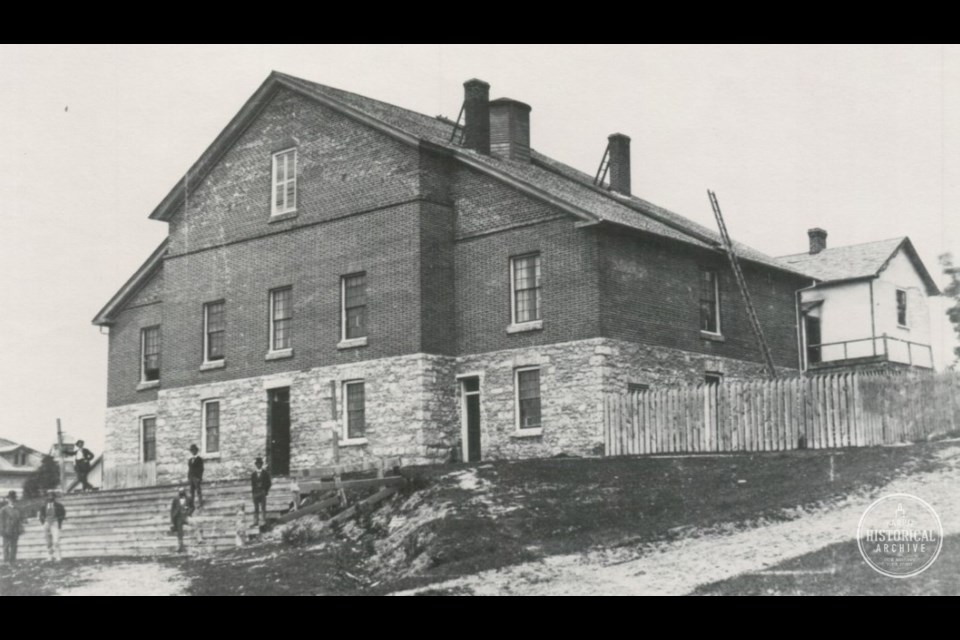“On learning that another murder had been committed in this now notorious hamlet, and being unable to gather reliable particulars relative to this melancholy occurrence, we despatched a special reporter to the locality on Tuesday evening.”
This quote was printed in the Barrie Examiner on May 12, 1870, and it referred to the tiny community of Brentwood in Sunnidale Township, now part of Clearview.
It was difficult to imagine what could have caused such outrages in this quiet, rural area. The residents were hard-working farming folks, simply trying to eke out a living from the land. Everyone knew each other, so it was unthinkable one friend or neighbour might cause the death of another.
By this time, the Simcoe County Jail in Barrie had been standing for 30 years and had not yet received a visit from the hangman. That would soon change. In 1873, it was an Essa Township farmer who first climbed the gallows stairs.
Sadly, where alcohol abuse, money problems and domestic upheaval are found, murder can also follow. The quiet of the countryside is no more immune to violence than are the streets of a large city.
John Schell and Thomas Ross were neighbours, friends and brothers-in-law. Both Thomas Ross and Schell’s wife, Mary Jane, were the offspring of Alexander Ross and his wife, Mary, who farmed in West Gwillimbury Township.
On Feb. 2, 1869, three men took a walk through the bush in Sunnidale Township. It was late at night, and must have been cold, but the trio were kept warm by the contents of a flask brought along by Thomas Kenyon, proprietor of the Globe Hotel in Angus.
Kenyon lamented to his companions, Thomas Ross and a man called Armstrong, he had lost some money the previous week. It amounted to some $90 and he suspected it had been stolen. Ross supplied a theory that soon caused a lot of trouble.
He suggested it was his brother-in-law, John Schell, a Brentwood shingle maker, who had pilfered the cash and then secreted it in the rafters of his home. After that, the three men headed straight for the Schell house.
The story of what happened next came out during the murder trial of Schell the following April. But, in true 19th-century style, law enforcement had not arrived until the next day, perhaps later.
As Schell’s father’s house was just down the road, many of his family members stayed overnight in the house where the tragedy occurred, while the body of Ross lay on the floor. So much for preserving the crime scene.
Dr. McManus, the local coroner, performed a postmortem on the body of Ross. Robert Schell, brother of the accused, hired a doctor of his own choosing to perform a second autopsy.
During the trial of John Schell, it was learned from the testimony of witnesses, almost all of them Schell family members, that Thomas Ross had arrived at the Schell home under the influence of whisky and full of accusations. He demanded Schell return the stolen money to Kenyon, after which an argument and a physical altercation broke out.
Schell, feeling insulted, denied everything, and then pushed Ross outside after bettering him in the fight. The witnesses next heard Mrs. Schell cry out, “Look out, John. Here comes Ross with an axe to kill you,” which seems an odd thing for the sister of the victim to have said.
It was then that John Schell took down his shotgun and shot his brother-in-law in the head. He reportedly told Kenyon and Armstrong he did not regret shooting Ross but would turn himself in to a constable as soon as possible.
In the spring, a one-day trial was held at the Barrie Courthouse. There was no doubt about who had killed Thomas Ross. Only the circumstances were up for debate.
The numerous witnesses for the defence sowed enough seeds of doubt that a verdict of guilty of manslaughter was rendered that same day. The sentence was two years in the penitentiary, saving the hangman a long ride into the wilds of Simcoe County.
This corner of the county slowly settled back into peace again. Unfortunately, that peace would be short lived.
Each week, the Barrie Historical Archive provides BarrieToday readers with a glimpse of the city’s past. This unique column features photos and stories from years gone by and is sure to appeal to the historian in each of us.



